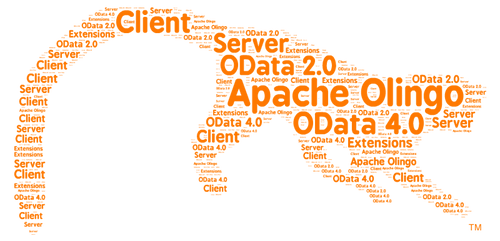Debug Support and Error Handling¶
OData Error Conditions¶
OData exposes error conditions as HTTP responses with error status code (4xx and 5xx) and it is in the responsibility of a client to handle this situations. For more details see OData Error Conditions.
In OData the format for error messages is described in OData-Atom and Odata-JSON. Apache Olingo OData2 has implemented this this format for error message.
Debug Support¶
The OData V2 error message format is limited to the HTTP status codes and gives indicators for client errors (status code 4xx) and server errors (5xx). For development and support this is not sufficient because of more technical information is needed for doing a deep error analysis.
Apache Olingo has implemented a feature to return more error information (stack traces, object states, runtime measurements …) within a response to ease the development and support use case.
For uses cases in a production environment this feature is by default off. The following explains how to enable the feature and gives options to a service implementation to switch if on and off e.g. role based or by configuration.
DebugCallback¶
The debug feature can be enabled by the following callback implementation:
public class MyDebugCallback implements ODataDebugCallback {
@Override
public boolean isDebugEnabled() {
boolean isDebug = …; // true|configuration|user role check
return isDebug;
}
}
Register DebugCallback¶
In your service factory (ODataServiceFactory) implement the following method to register the callback:
public <T extends ODataCallback> T getCallback(final Class<T> callbackInterface) {
T callback
if (callbackInterface.isAssignableFrom(MyDebugCallback.class)) {
callback = (T) new MyDebugCallback();
} else {
callback = (T) super.getCallback(callbackInterface);
}
return callback;
}
If this is in place then the url query option odata-debug=json will return detailed error information in json format for each request.
Query for Debug Information¶
JSON Debug View
Request url: http://localhost:8080/olingo-odata2-ref-web/ReferenceScenario.svc/?odata-debug=json
Response:
{
"body": "<?xml version='1.0' encoding='utf-8'?><service xml:base=\"http://localhost:8080/olingo-odata2-ref-web/ReferenceScenario.svc/\" xmlns=\"http://www.w3.org/2007/app\" xmlns:atom=\"http://www.w3.org/2005/Atom\"><workspace><atom:title>Default</atom:title><collection href=\"Employees\"><atom:title>Employees</atom:title></collection><collection href=\"Teams\"><atom:title>Teams</atom:title></collection><collection href=\"Rooms\"><atom:title>Rooms</atom:title></collection><collection href=\"Managers\"><atom:title>Managers</atom:title></collection><collection href=\"Buildings\"><atom:title>Buildings</atom:title></collection><collection href=\"Container2.Photos\"><atom:title>Photos</atom:title></collection></workspace></service>",
"request": {
"method": "GET",
"uri": "https://localhost:8080/olingo-odata2-ref-web/ReferenceScenario.svc/?odata-debug=json",
"headers": {
"Accept": "text/html,application/xhtml+xml,application/xml;q=0.9,*/*;q=0.8",
"accept-encoding": "gzip, deflate",
"accept-language": "de-de,de;q=0.8,en-us;q=0.5,en;q=0.3",
"connection": "keep-alive",
"Content-Type": null,
"cookie": "JSESSIONID=C6A2403F354B61B1E645744FABCB7FB6C6BC5DA41BC841823647CF2DFF001556; BIGipServerlocalhost=3543090186.26911.0000",
"host": "localhost:8080",
"user-agent": "Mozilla/5.0 (Macintosh; Intel Mac OS X 10.8; rv:24.0) Gecko/20100101 Firefox/24.0",
"x-forwarded-for": "173.12.210.11"
}
},
"response": {
"status": {
"code": 200,
"info": "OK"
},
"headers": {
"DataServiceVersion": "1.0",
"Content-Type": "application/xml;charset=utf-8"
}
},
"runtime": [{
"class": "ODataRequestHandler",
"method": "handle",
"duration": 1911,
"memory": 191,
"children": [
{
"class": "UriParserImpl",
"method": "parse",
"duration": 66,
"memory": 0,
"children": {}
},
{
"class": "Dispatcher",
"method": "dispatch",
"duration": 1029,
"memory": 95,
"children": {}
}
]
}]
}
HTML Debug View
Request url: http://localhost:8080/olingo-odata2-ref-web/ReferenceScenario.svc/?odata-debug=html to get a self-contained HTML document with all information that is in the JSON output but can be viewed conveniently in a browser.
Custom Debug Output¶
Starting with release 1.2, it is possible to create custom debug output. The complete formatting of the debug-support information can be implemented in a callback method.
Add to the already existing getCallback method before the line with else a condition check whether the given ODataCallback is a DebugWrapperCallback.
} else if (callbackInterface.isAssignableFrom(ODataDebugResponseWrapperCallback.class)) {
callback = (T) new DebugWrapperCallback();
}
which then results in following method
public <T extends ODataCallback> T getCallback(final Class<T> callbackInterface) {
T callback
if (callbackInterface.isAssignableFrom(MyDebugCallback.class)) {
callback = (T) new MyDebugCallback();
} else if (callbackInterface.isAssignableFrom(ODataDebugResponseWrapperCallback.class)) {
callback = (T) new DebugWrapperCallback();
} else {
callback = (T) super.getCallback(callbackInterface);
}
return callback;
}
and implement the callback class
private final class DebugWrapperCallback implements ODataDebugResponseWrapperCallback {
@Override
public ODataResponse handle(final ODataContext context, final ODataRequest request, final ODataResponse response,
final UriInfo uriInfo, final Exception exception) {
if ("true".equals(request.getQueryParameters().get("my-debug"))) {
return DebugResponseWrapper.handle(context, request, response, uriInfo, exception);
} else {
return response;
}
}
}
where DebugResponseWrapper is a class you have to implement which does
the real work.
Please note that this callback is not called if the built-in debug output is requested as described above.
Log and Trace Support¶
Apache Olingo has no dependencies to any specific log and trace api (e.g. slf4j, log4j …) and with that it does not trace anything by default. This is to keep the library independent from a specific api so that it can be used on any JEE compliant platform independent from which l&t api is offered there.
Anyhow log and trace is required for most production environments and the following recommendations are given:
Servlet Filter¶
For tracing the http traffic (request url, query parameter, http headers, response code …) to and from the server it is recommended to implement a servlet filter on top of the service. This is completely independent from the Apache Olingo OData library and has no restrictions.
Service Processor Implementation¶
To trace OData activities (read/write activities) at the server it is recommended to do that within a custom processor implementation.
Error Callback¶
Because of OData requires to handle error situations someone can hook into the handling and trace information there.
Simply implement another ODataCallback interface and register it within a ODataServiceFactory.
Callback:
public class MyErrorCallback implements ODataErrorCallback {
@Override
public ODataResponse handleError(ODataErrorContext context) throws ODataApplicationException {
LOGGER.severe(context.getException().getClass().getName() + ":" + context.getMessage());
return EntityProvider.writeErrorDocument(context);
}
}
Register Callback:
public <T extends ODataCallback> T getCallback(final Class<T> callbackInterface) {
T callback
if (callbackInterface.isAssignableFrom(MyDebugCallback.class)) {
callback = (T) new MyDebugCallback();
} else if (callbackInterface.isAssignableFrom(MyErrorCallback.class)) {
callback = (T) new MyErrorCallback();
} else {
callback = (T) super.getCallback(callbackInterface);
}
return callback;
}
Copyright © 2013-2025, The Apache Software Foundation
Apache Olingo, Olingo, Apache, the Apache feather, and
the Apache Olingo project logo are trademarks of the Apache Software
Foundation.

